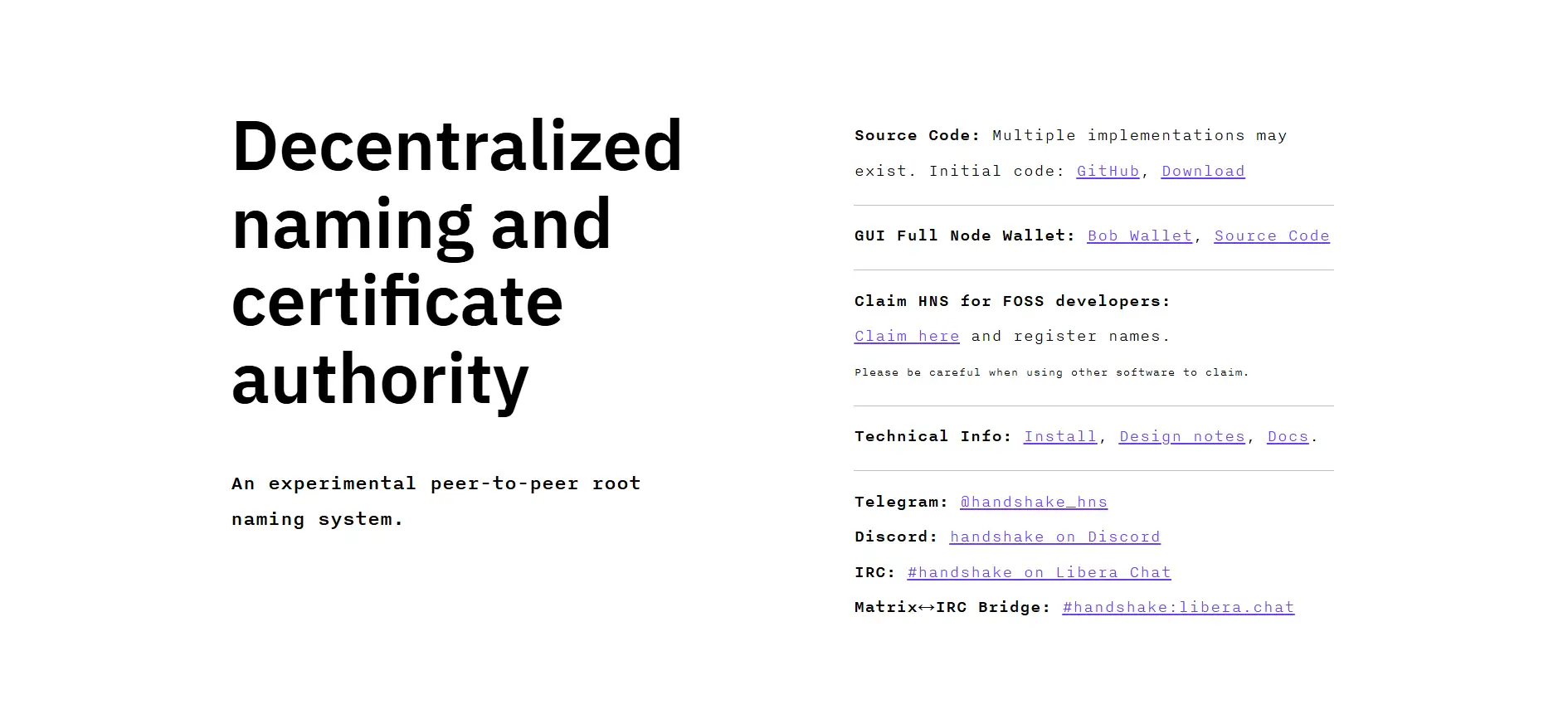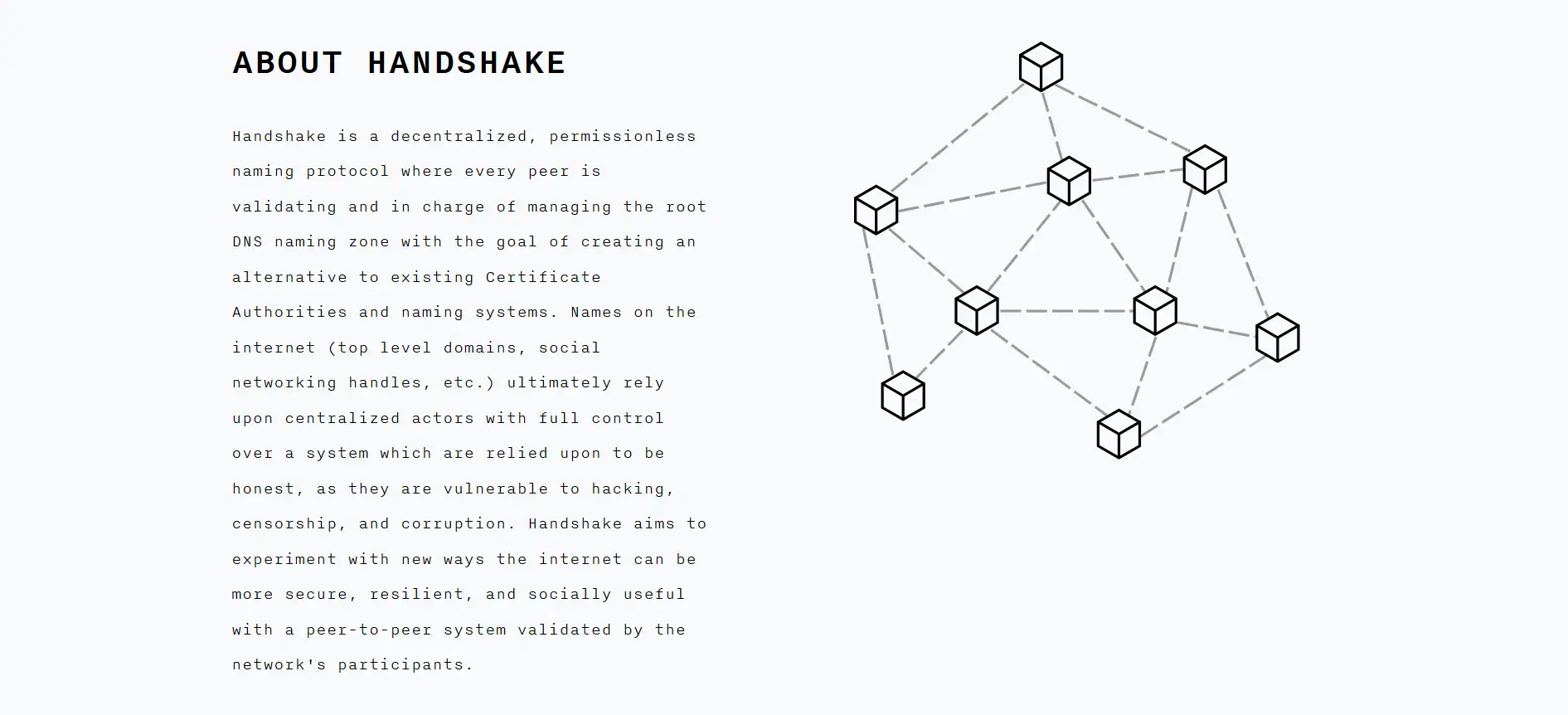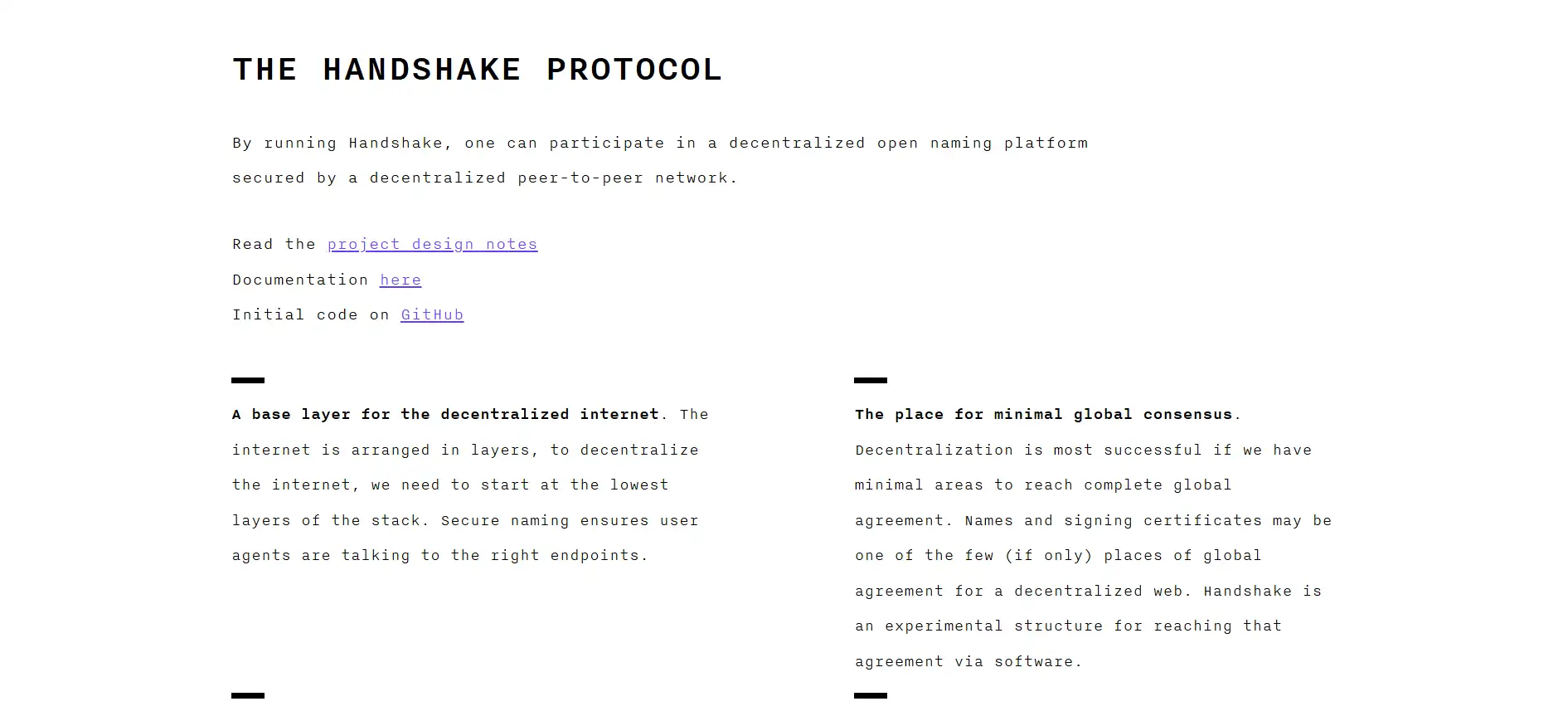About Handshake
Handshake is a decentralized, permissionless protocol that reimagines how top-level domain (TLD) names are assigned, verified, and maintained on the internet. It introduces a blockchain-based naming system to replace the traditional role of centralized Certificate Authorities (CAs) and the root DNS zone file. Rather than depending on third-party entities for name assignment and authentication, Handshake distributes ownership and control of the naming infrastructure to the network participants themselves, thereby offering a more secure, censorship-resistant, and resilient alternative.
By integrating economic incentives into name registration through the use of a blockchain, Handshake prevents monopolization and squatting of names. Its mechanism ensures fairness via a transparent, decentralized auction system. The protocol was designed to bring back the original decentralized vision of the internet, addressing the over-centralization that has occurred with large corporations managing identities and resources. With Handshake, users can claim and manage TLDs with cryptographic keys, supporting truly decentralized web services and applications.
Handshake is a protocol built to fundamentally alter the structure of internet naming by establishing a decentralized root zone that is accessible and verifiable by anyone running its software. This removes the dependence on centralized authorities like ICANN and major certificate authorities that currently serve as the gatekeepers of DNS and SSL infrastructure. Handshake offers an open-source alternative to these authorities by embedding the root zone into a public blockchain, ensuring transparency and trustless validation.
The Handshake blockchain uses a proof-of-work consensus model similar to Bitcoin and manages DNS TLDs through a system of unspent transaction outputs (UTXOs). All domain name registrations are handled through an on-chain auction system using covenants—a smart contract-like capability within the blockchain's consensus rules. This architecture provides a secure, immutable history of name ownership and eliminates the risk of DNS hijacking or certificate authority compromise. Importantly, Handshake does not aim to replace DNS entirely but to decentralize its most critical and centralized component: the root zone file.
One of Handshake’s notable features is its emphasis on sybil resistance. By incorporating economic costs into its naming system (i.e., auctions requiring HNS coin bids), it disincentivizes malicious spam registrations and ensures equitable distribution of TLDs. It allows developers to prove identity and domain ownership in a cryptographically secure manner. Additionally, light clients and DNS resolvers can be used without the full node, enabling broader accessibility while maintaining decentralization and integrity.
The Handshake protocol was developed to support freedom of expression and user autonomy, particularly in regions where governments control access to the domain name system. The team also pre-reserved over 100,000 domains for trademark holders and high-traffic websites to allow a smoother transition and to protect brand identity. These reserved names can be claimed cryptographically without reliance on third parties.
There is no single foundation, company, or committee in control of the network. The project started with the backing of contributors from Purse.io and Private Internet Access, along with a one-time allocation of HNS coins to Free and Open Source Software (FOSS) developers and organizations. This allocation ensures that the protocol is operated by those most aligned with its vision. The project encourages community development via forums like GitHub, Telegram, IRC, and Discord. Competitors and similar projects in the space include Ethereum Name Service (ENS) and Namecoin, although Handshake focuses more on root-level decentralization rather than subdomain or DApp name services.
Handshake provides numerous benefits and features that make it a unique force in the decentralized naming ecosystem:
- Decentralized Root Zone: Replaces centralized DNS root zones and certificate authorities with a blockchain-based public root zone file.
- Sybil Resistance: Uses economic incentives and proof-of-work mining to discourage spam and centralized hoarding of domain names.
- Open Auctions: Domain names are allocated through a transparent Vickrey auction process, reducing name squatting and price manipulation.
- Interoperable Naming: Compatible with existing DNS systems and can act as a drop-in decentralized alternative without changing how the internet functions.
- Permissionless and Open Source: Anyone can run a node, participate in auctions, or claim pre-reserved names without needing corporate or governmental approval.
- Developer-Driven Allocation: Over two-thirds of the initial HNS supply was distributed to open-source contributors and FOSS communities to decentralize ownership.
- Light Client Support: Tools like hnsd allow lightweight verification of name records without running full nodes, increasing accessibility.
Handshake offers a relatively straightforward setup for those looking to explore or integrate the protocol into their digital infrastructure:
- Install a Wallet: Start by downloading the official Bob Wallet, a graphical user interface wallet that lets you participate in auctions, register domains, and manage your HNS.
- Run a Full Node: For more advanced users, running hsd (Handshake Daemon) provides full access to blockchain validation and direct auction interactions.
- Use a Light Client: The hnsd client offers a more resource-efficient method to resolve names securely without a full node.
- Join the Community: Get involved via Telegram, IRC, and GitHub. Connect with developers, ask questions, or propose ideas.
- Claim Your HNS: Free and Open Source developers may be eligible to claim HNS tokens. Visit the official site and follow the claim instructions to see if you're eligible.
- Participate in Auctions: Use your wallet or node to bid on new domain names through the built-in Vickrey auction system. Auctions open weekly, and winners are determined based on the second-highest bid.
- Integrate into DNS: Set up SPV resolvers or configure your DNS settings to start using Handshake names directly with supported browsers or plugins.
Handshake FAQ
Handshake is a decentralized naming protocol that replaces the centralized root DNS zone and traditional Certificate Authorities with a peer-to-peer, permissionless system. It provides a secure and censorship-resistant way to register and manage top-level domains (TLDs), enabling users to own domain names without relying on centralized registrars or trust anchors. Learn more on the official site.
HNS is the native utility coin of the Handshake network. It is used to bid, register, and renew domain names on-chain through a decentralized auction process. The coin also serves as a sybil resistance mechanism, preventing spam and ensuring fair distribution of names. Winning bids are burned, reducing total supply. You can explore more on handshake.org.
Handshake allows free and open source developers to claim HNS coins directly through a decentralized on-chain process. Trademark holders can claim names during a sunrise period using cryptographic proof via DNSSEC to establish ownership. Details are available on the Handshake FAQ.
Handshake decentralizes the root zone and certificate trust model. Unlike traditional DNS, which relies on 12 centralized root authorities and private Certificate Authorities, Handshake creates a global consensus on name ownership using blockchain technology. It provides verifiable ownership of domains and cryptographic proof of authenticity, removing the need for third-party trust anchors.
Yes. Bob Wallet is a user-friendly GUI wallet for managing HNS coins and domain auctions. It allows users to participate in name registration, bidding, transfers, and renewal, all within a full-node interface.
You Might Also Like












